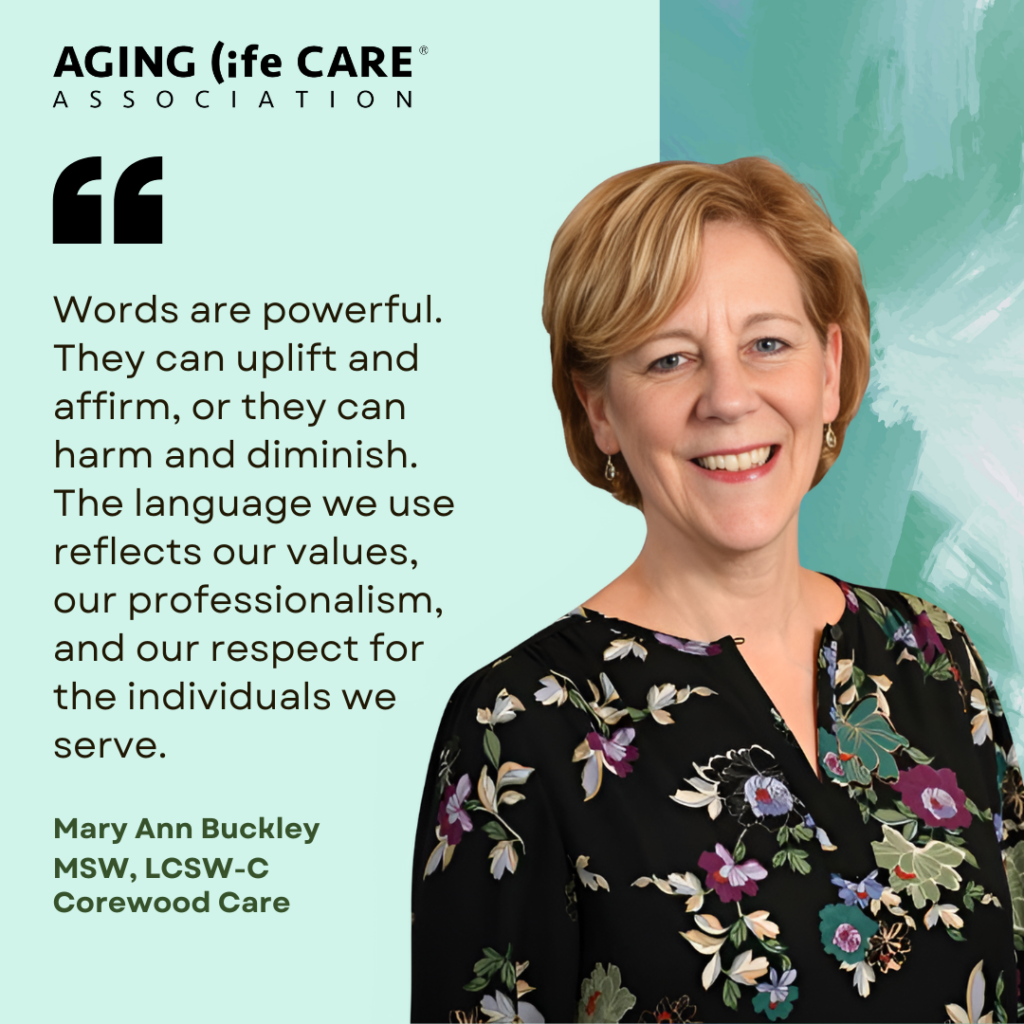
Words Matter: Elevating Our Language, Elevating Our Profession
By Mary Ann Buckley, LCSW-C
Words can do so much.
As a Social Worker with over 30 years of experience—primarily in the field of Aging Life Care management—I’ve accumulated countless thoughts and observations over the years. I’ve witnessed profound changes in our field and also identified areas where I believe meaningful change is still needed. Words Matter.
One such moment of inspiration came during the Aging Life Care Association® (ALCA) Town Hall Meeting, when ALCA President Steve Barlam unveiled his theme for the year: Elevating the Profession. His message, centered around the idea of “raising people up,” invigorated me and sparked a renewed sense of purpose.
As Aging Life Care Professionals®, we strive every day to raise up our clients through advocacy, education, engagement, crisis intervention, and more. We work hand-in-hand with families, collaborate with community partners, and coordinate with referral sources—all in the service of improving the lives of older adults.
And yet, one simple but impactful way we can elevate our profession is by examining the words we use.
Words are powerful. They can uplift and affirm, or they can harm and diminish. The language we use reflects our values, our professionalism, and our respect for the individuals we serve. I invite you to join me in rethinking some of the words that are, in my view, outdated, inaccurate, or unintentionally demeaning—and consider alternatives that convey dignity and compassion.
Let’s Start with “Placement”
Top of my list: placement. Ugh! We don’t “place” people. We place a plant on a shelf, but we do not place older adults. This word strips away individuality and dignity, reducing someone to an object being relocated. We don’t say we “place” children in school, or “place” young adults in college or on sports teams—so why use that term when referring to seniors?
Instead, let’s describe what we actually do: we assist older adults and their families in researching, touring, selecting, and transitioning into a senior living community that fits their needs. A move is often a time of uncertainty and emotional upheaval. Our role is to offer guidance, support, and advocacy to ensure a smooth, respectful transition—not to “place” someone as if they had no say.
“Facility” Is Next
Would you want to move to a “facility”? The word conjures up images of sterile hallways, locked doors, or even prisons and institutions. It’s cold, clinical, and devoid of the warmth and life that we hope to bring to every aging experience.
Let’s replace “facility” with “community.” That word suggests belonging, connection, and home. It’s a simple shift, but one that speaks volumes about how we view the environments where older adults live.
Let’s Talk About “Diapers” and “Pull-Ups”
Another important change: let’s rethink how we refer to incontinence products. Calling them “diapers” or “pull-ups” infantilizes older adults and can contribute to feelings of embarrassment or shame. These terms belong to a different stage of life—infancy—not adulthood.
Instead, use the term incontinence products. It’s respectful, accurate, and free from unnecessary stigma. Older adults facing incontinence deserve our sensitivity and support, not language that makes them feel small or powerless.
These word choices may seem small, but their impact is significant. As professionals dedicated to elevating the care and lives of older adults, we must also be mindful of how we elevate our language. Families look to us for guidance. Our words can either reinforce dignity or unintentionally chip away at it.

There are many other terms that deserve a closer look. But for now, I hope these examples resonate with you—and inspire you to think about the words you use every day.
Together, let’s elevate our profession by choosing language that reflects our respect, compassion, and commitment to the older adults we serve.
About the Author: Mary Ann Buckley, MSW, LCSW-C, is the director of Community Outreach and Education at Corewood Care. She is a Licensed Clinical Social Worker and Aging Life Care Manager who has over 30 years of experience in Social Work, 28 years with older adults and families and 20 of those years in Care Management. Mary Ann is a member of the Aging Life Care Association.